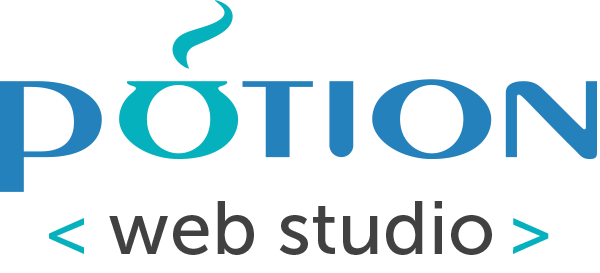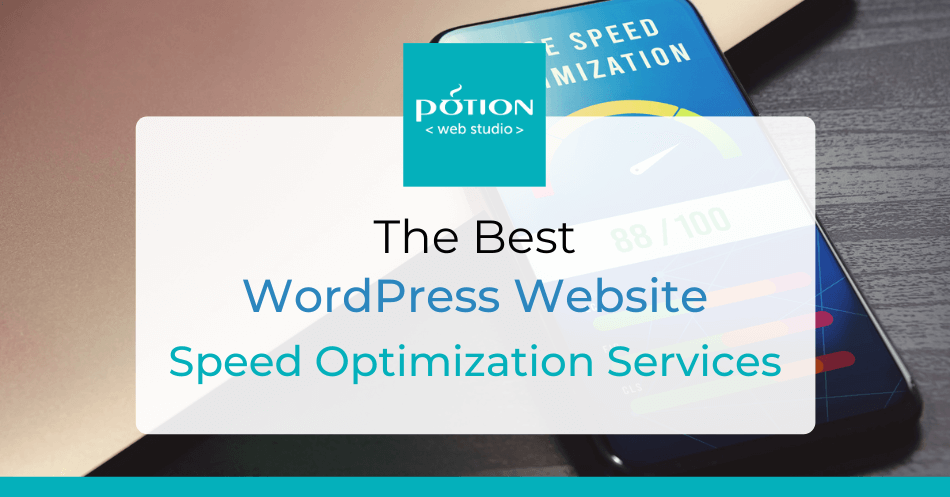Did you know, users will get bored of waiting for your site to load in less time than it takes to sneeze?
If your loading’s slow and sluggish, you’d better hope your audience has an attack of the sniffles every time they try to visit a page on your website.
Website speed is one of THE most important things you can optimize to give a good user experience. It matters because a massive 53% of people will leave a website if loading takes more than three seconds.
So even if your site’s full of incredible content, more than half your target audience just won’t see it if they have to wait.
Google recognizes this – it’s used site speed as a ranking criteria in its search algorithm for well over a decade. And though the impact on your ranking might be small, good site speed is another string to your bow when it comes to attracting visitors.
So, is your WordPress website fast enough? Do you know how to optimize for speed so your visitors stay engaged?
In this post, we’re looking at what speed optimization is, and how you can find the right speed optimization service for your WordPress website.
What is Website Speed Optimization?
Website speed optimization means making improvements to your website’s loading time.
If your pages are slow to load there are many factors that could be causing the problem, from hosting to image size, plugins to caching. To speed up your site effectively (and maintain its speedy performance) you’ll need to review each of these regularly and keep them up to date.
And if you have a WordPress site, you’ll find that speed optimization is particularly important. WordPress sites are so customizable, there are loads of plugins and themes you can add to improve functionality and appearance. While these can make things easier for both visitors and business owners, they can also slow your site down significantly if you don’t keep them in check.
What factors affect website speed?
Good question. There are several elements of a website that can impact site speed. When you’re looking to optimize, make sure you think about all of them – you don’t want your entire site to be held up by a problem you missed in one area.
Hosting
Your website’s stored on a remote server. This is known as hosting. When a user wants to visit your site, they’re effectively requesting files and programs to run from another computer. Hosting speed is affected by how many other web pages use the same server as yours, how powerful the server is, and how many requests it’s trying to deal with.
The faster the remote computer can respond to your user’s request, the faster they get to see your WordPress website.
Images
You probably have plenty of images on your website. These might include logos, product pictures, team photos, or projects you’ve fulfilled for your clients.
Images make up the largest part of a page’s size. And simply put, the larger the image, the more data has to travel from the server to your user’s phone or laptop, so the longer it’ll take your website to load.
Surprisingly, it’s not just about the number of pixels when you’re thinking about image optimization, there are other factors to think about, too. File format, the way your image has been compressed, and the dimensions will all play a part in slowing your site.
Caching
Caching – or the lack of it – can make a big difference to your website’s load time. Caching is where some elements of your website are stored (temporarily) on a user’s computer so that next time they visit your site, those bulky images or lines of code don’t have to be loaded all over again.
Good use of caching will speed up your website’s loading time, bringing a better UX (User Experience) to your site visitors.

WordPress-specific website speed factors
If your site’s built using the world’s most popular website builder, WordPress, there are additional ways you can improve the speed of your website.
Plugins
One of the main places to improve the loading speed of your WordPress website is your plugins. A plugin is an extra piece of software that’ll bring added functionality – without having to code it yourself.
A plugin could add something as simple as social media buttons or enable something as important as e-commerce.
In other words, there are plugins wherever you look on WordPress. Since they all operate on your website server, they take up processing power and can slow your site down.
So how should you tackle this?
Look for WordPress plugins that operate at the backend of your site. They’ll slow your site less. And remember to check out reviews by other website owners before you choose – you’ll discover which plugins are best for maintaining speed.
Themes
WordPress themes can be guilty of slowing your site, too. That’s because some themes include pre-installed plugins or huge file sizes. Check whether you need all the plugins and whether the files are really necessary – you might be able to remove the features you don’t need. Alternatively, switch to a different theme that meets your needs but allows your site to speed up.
Page builders
If you’ve built your WordPress website without getting a professional web developer on board, you’ve probably used a page builder to help you out.
Your website might look great, but unfortunately, website builders can slow your site down. This is because some are full of excess code and plugins you don’t really need.
A pro web dev can help you sort this, or if you prefer to do it yourself, stick to simple themes and test your site speed as you build.
What do we include in our website speed up service?
How does your site perform? Do you really know how fast it is? And do you know how to make it better?
With so many factors having an impact, how will you optimize your WordPress website speed?
Luckily, you’re not on your own. Here’s how we optimize WordPress website speed for our clients at Potion Web Studio:
Step One: Initial performance audit
This is where we test how fast your website REALLY is. And get some clues about what might be slowing it down.
Step Two: We speed up your site
We use an extensive process to look at everything from images and caching to code optimization and hosting.
We’ll update or remove outdated or unnecessary plugins, clean up bloated code and check your themes are up to date.
We’ll even tell you whether a better host would be more appropriate – for example, one that offers dedicated hosting instead of shared hosting, so you’re not in competition with other websites for storage space and processing power.
Step Three: We test your WordPress website speed again
We put your WordPress website through numerous tests to make sure it runs smoothly and quickly.
We make final tweaks, and your site’s sorted.
Congrats! Your WordPress website’s now slick, speedy, and ready for your users.
Review of top WordPress website speed optimization services
Of course, we’re not the only speed optimization service out there. Take a look at some of the other providers to find the right service for you:
WP Speed Fix
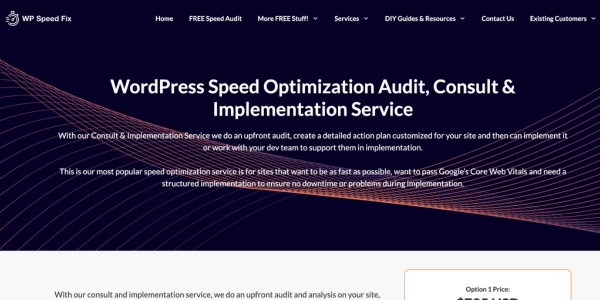
WP Speed Fix can help you work out what’s making your WordPress site slow and optimize your site to raise your score in Google PageSpeed Insights. They also offer training for marketers and SEOs.
WP Speed Fix pricing
Prices start at $795 for an audit and consultation (so you can implement the changes yourself).
If you want them to do the work for you, it’s $995 for a simple site or $2495 for a bigger, complex site.
WP Speed Fix reviews
WP Speed Fix gets 4.9 stars out of 5, based on 38 reviews from Google
WP Buffs
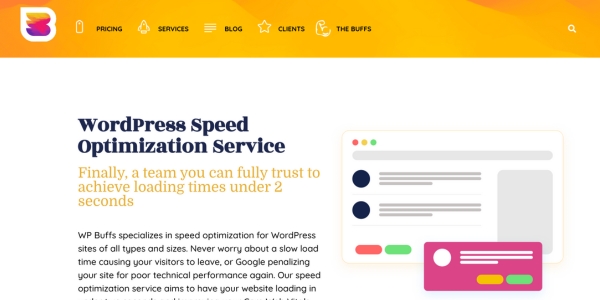
WP Buffs promises to get your site loading in under two seconds – no matter what type or size of WordPress site you have – enhancing your Core Web Vitals.
WP Buffs pricing
Maintenance plans that include speed optimization start at $219 per month.
WP Buffs reviews
Google users have rated WP Buffs at 4.6 stars from 106 reviews.
W3 Speed Up
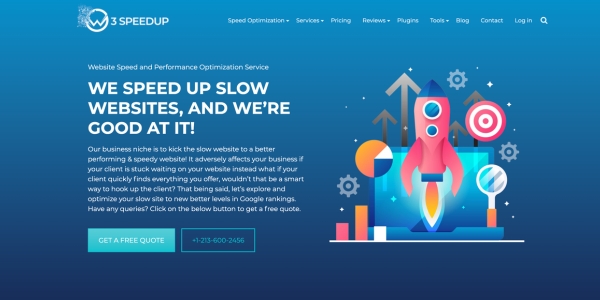
Speed Optimization for a range of CMS platforms (not just WordPress), W3 Speed Up guarantees a score of 90 or more on Google PageSpeed Insights.
W3 Speed Up pricing
A one-off service starts at $150 for the basic package. But look out for a deal – they sometimes discount their pricing.
W3 Speed Up reviews
5 stars from 29 Google reviews.
TunedWP
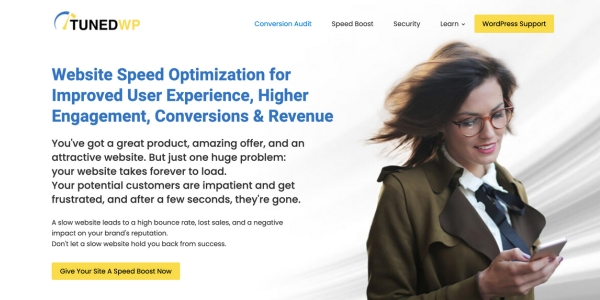
Speeding up sites to reduce bounce rate and improve brand reputation, Tuned WP offers either a one-off speed boost or an ongoing monthly optimization plan.
TunedWP pricing
A one-off service costs $640, a monthly plan comes in at $450 per month.
TunedWP reviews
TunedWP gets 5 stars from 16 reviewers.
UnlimitedWP
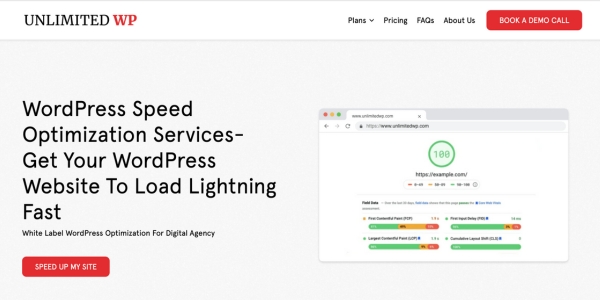
UnlimitedWP offers lightning-fast loading for WordPress websites, white-labelling their services through digital agencies to get website owners sites that load in under 3 seconds.
UnlimitedWP pricing
UnlimitedWP charge out their services at $97 per month per site.
UnlimitedWP reviews
28 Google reviewers on Google have given UnlimitedWP 5 stars.
Ready to optimize your WordPress website speed?
Internet users are impatient – and they have a short attention span. If your site doesn’t load in the blink of an eye, they’ll quickly get bored and go to your competitors.
Naturally, you’ll want your site to load as fast as possible to improve your users’ experience – but it’s not easy to know where to start. It can be hard to find what’s causing your WordPress site to load slowly, and fixing the problem can be another minefield.
Get a pro on the case – someone who knows WordPress sites inside out, and choose a speed optimization service that works for your specific needs. Whether you’re looking for a one-off hit or ongoing support, you can’t afford to not optimize your site speed.
Want to talk things through? Get in touch with Potion. We’ll chat about what you’re looking for and carry out a free audit, so you’ll know what’s working well and where your WordPress site speed can be optimized.
